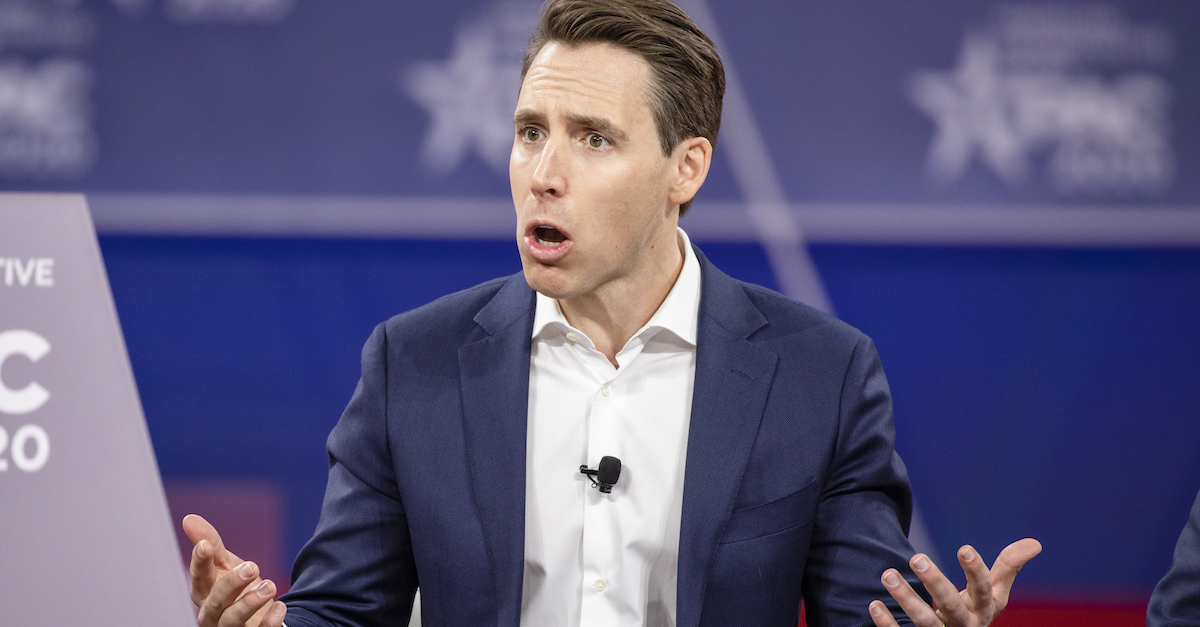In Trump-Twitter Feud, Republican Senator Suggests Hitting the One Legal Nerve That Could Wreck the Internet As We Know It

President Donald Trump’s well-documented war with Twitter has resulted in the resurrection of suggestions by Sen. Josh Hawley, a Missouri Republican, that key legal protections for websites should be stricken from our nation’s laws.
The legal controversy began with Trump’s much-ballyhooed proclamation that Twitter “is now interfering in the 2020 Presidential Election.”
“They are saying my statement on Mail-In Ballots, which will lead to massive corruption and fraud, is incorrect, based on fact-checking by Fake News CNN and the Amazon Washington Post, Trump tweeted. “Twitter is completely stifling FREE SPEECH, and I, as President, will not allow it to happen!”
Trump’s legal ability to “not allow” Twitter to speak as it wishes, or to force the private company to allow speech it wishes to censor, is itself dubious as a matter of First Amendment law. But what is more interesting and more troubling for the platform and others like it is the suggestion by Hawley that certain decades-old liability shields be erased.
“Twitter is getting subsidized by the federal government for that interference in the form of special immunity worth billions,” Hawley tweeted in response to Trump “Time to end #BigTech sweetheart deal w/ government,” he said.
Hawley followed that tweet with a Wednesday morning Fox News appearance which preceded a letter Hawley wrote to Google CEO Sundar Pichai. “Unfortunately, your company is not alone in censoring content to curry favor with the Chinese Communist Party,” the letter states. “This kowtowing is unacceptable. Selling out American principles to curry favor with communist officials is no way to run an American business—regardless of who else is doing it.”
Hawley set a June 12 deadline for Google’s response to a list of questions.
On Fox News, Hawley tied the Google censorship idea to that espoused in his Trump retort above:
“A lot of censorship directed at speech apparently that, uh, the Big Tech doesn’t like … It’s not just censorship in China … they’re censoring Americans; Google, YouTube is censoring Americans who are criticizing the Chinese Communist Party, taking their comments down. Why? I mean — what is going on here? Now, as you say, Twitter is censoring the President of the United States. Here’s the bottom line on this: Big Tech gets a huge handout from the federal government; they get this special immunity — this special immunity from suits and from liability that’s worth billions of dollars to them every year. Why are they getting subsidized by federal taxpayers to censor conservatives; to censor people critical of China. They need to explain; we need to some answers.”
Hawley is presumably speaking about Section 230 of the Communications Decency Act. He has been critical of it and has suggested changing it in the past.
That provision of federal law, “to promote the continued development of the Internet and other interactive computer services,” ultimately shielded digital media companies from liability for content posted on their sites. In other words, they can make a lot more money because federal law says they cannot be sued.
The law deems that websites are not a “publisher or speaker,” and that has profound legal implications.
“No provider or user of an interactive computer service shall be treated as the publisher or speaker of any information provided by another information content provider,” the letter of the law says. Those 1990s terms are best used in modern language for clarity: an “interactive computer service” is basically a website; an “information content provider” is a person or organization which actually writes or creates content.
Legally, this means websites which rely on user-generated content — Facebook, YouTube, Twitter, etc. — cannot be sued for defamation, libel, or slander based on the words supplied by users. Book publishers, radio stations, and television stations can be sued if a man on the street is interviewed and if the man defames someone. The personal injury law axiom of going for the deep pockets financially applies to traditional media companies but not to websites. YouTube cannot be sued for defamatory videos.
The law also contains clear liability shields for websites which take action “voluntarily” and “in good faith to restrict access to or availability of material that the provider or user considers to be obscene, lewd, lascivious, filthy, excessively violent, harassing, or otherwise objectionable, whether or not such material is constitutionally protected.” It also explicitly preempts inconsistent state laws. That means websites can, like newspapers, edit content and take down inflammatory statements; however, unlike newspapers, they — again — cannot be sued for exercising this power.
Law&Crime has in the past explored Section 230 here.
Congress’s intent in passing the law was, again, to financially reward the internet and to encourage companies to flourish without getting sued for a million dollars every time two high school students publicly questioned one another’s chastity or every time a couple on a road trip wrote a scathing review about the cleanliness of the kitchen at a local dive.
The First Amendment is a poor legal vehicle for a fight with a social media company. After all, the amendment plainly says “Congress shall”: it applies to the government only. What the government could more easily do is to change Section 230. Such a move would result in a blood-curdling scream from internet speech advocates, but it would unquestionably be within Congress’s power.
[Image via Samuel Corum/Getty Images]
Have a tip we should know? tips@lawandcrime.com